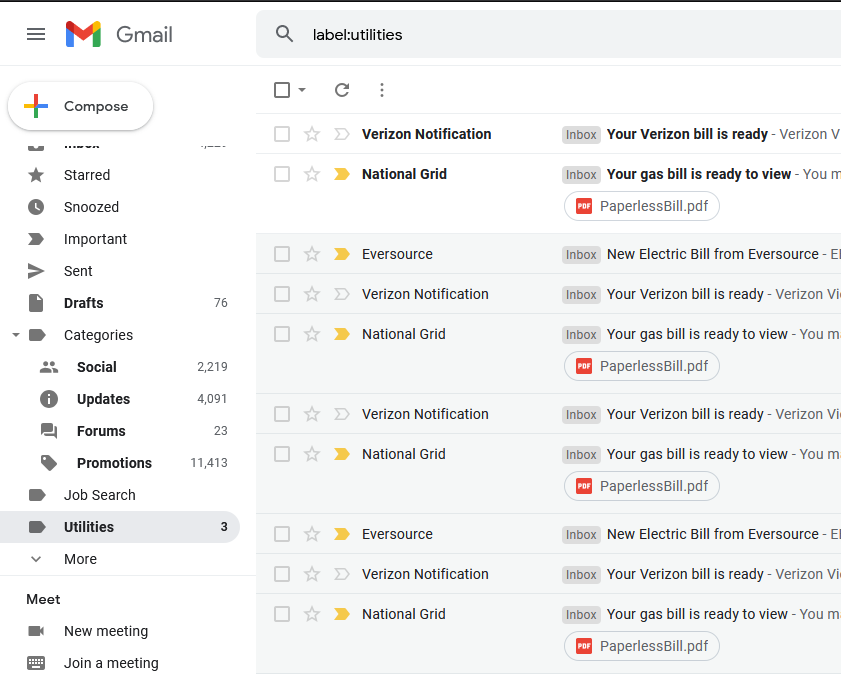PyCollect
tl;dr: Like a true engineur, I spent many hours automating something that could’ve been done manually in 5 mins. Source
For those who don’t know, I own a cozy 3 bedroom apartment in the Roxubry/Jamaica Plain area and rent 2 of the rooms out. The way I calculate the rent due each month is pretty standard. I charge a flat rate for each room and split the utilties with my roommates/tenants each month. Although this only takes ~5 minutes a month, it tends to slip my mind and having to dig through my email/utilities accounts to find the monthly amounts can get really annoying… So why not automate it? Btw, the code for this projects is open sourced on Github here.
Setting things up
As always, the first step to automating anything is simplifying the problem. Instead of having to run through each portal and scrape the data etc., I made sure that each utilities bill was synced to my email account and signed up for paperless billing (go green, baby). Along with that, I created a Utilities label and filtered all my bills into that label for easy searching.

Now we can finally have some fun with Python. The flow of the program is pretty straightforward. The steps are:
- Connect to Gmail
- Get mail from utilities label
- Get dollar amounts from mail
- Request Amounts from roommates
The Code
I’m only going to talk about the interesting portions of the program.
To connect to the gmail API, I just used the starter script from the documentation. In addition to this, I needed a couple extra helper functions so I wrapped it into a class like so:
class Calculator():
...
def connect_to_gmail(self):
# The file token.pickle stores the user's access and refresh tokens, and is
# created automatically when the authorization flow completes for the first
# time.
if os.path.exists('token.pickle'):
with open('token.pickle', 'rb') as token:
self.creds = pickle.load(token)
# If there are no (valid) credentials available, let the user log in.
if not self.creds or not self.creds.valid:
if self.creds and self.creds.expired and self.creds.refresh_token:
self.creds.refresh(Request())
else:
flow = InstalledAppFlow.from_client_secrets_file(
'credentials.json', SCOPES)
self.creds = flow.run_local_server(port=0)
# Save the credentials for the next run
with open('token.pickle', 'wb') as token:
pickle.dump(self.creds, token)
self.service = build('gmail', 'v1', credentials=self.creds)
...
With access to my inbox, I could start looking through my messages. Since I only wanted to get the bills from the past month, I had to create a date query and attach to to my requests.
...
def get_past_month_date(self, year, month):
if(month == 1):
return datetime.date(year-1, 12, 1)
else:
return datetime.date(year, month, 1)
def get_mail_messages(self,labels):
today = datetime.date.today()
searchDate= self.get_past_month_date(today.year, today.month)
dateQuery = 'after:{searchDate}'.format(
searchDate=str(searchDate).replace('-', '/'))
utilities = self.service.users().labels().get(
userId='me', id=self.label_id).execute()
messages = self.service.users().messages().list(
userId='me', labelIds=self.label_id, q=dateQuery).execute()
return messages
...
Now that I finally have my messages, all I need to do is parse them for the dollar amounts and send a Venmo request. There’s just one more thing. The messages are base64 encoded. No worries, though, by running it through Python’s built in base64 decoder, I was able to get the plaintext. I thought I’d be able to easily search through to get the dollar amounts. However, The emails aren’t all that pretty in non-html form. They usually come with images, formatting etc. which makes them kinda ugly.
This is where Regex comes in! By creating a regex search pattern, I was able to loop through the messages and get the dollar amounts fairly easily. The regex pattern only looks for a ‘$’ followed by numbers and a period and terminates once it hits a space.
...
def compile_regex(self):
self.regexQuery = re.compile(r'([\$]+[\060-\071.]*)')
def get_dollar_amount(self, messages):
total = 0
for message in messages['messages']:
reply = self.service.users().messages().get(
userId='me', id=message['id'], format='raw').execute()
msg_str = base64.urlsafe_b64decode(
reply['raw'].encode("utf-8")).decode("utf-8")
found = self.regexQuery.search(msg_str)
amount = float(found.group(0).split('$')[-1])
total += amount
return total
...
I wrapped both the get_mail_messages and get_dollar_amount into a nice little method which looks pretty clean
def get_utilities_total(self):
# Call the Gmail API
results = self.service.users().labels().list(userId='me').execute()
labels = results.get('labels', [])
messages = self.get_mail_messages(labels)
total = self.get_dollar_amount(messages)
return total
And now comes the final piece which is finally collecting the damn rent to pay the bills. The unofficial Venmo API makes this fairly easy to do by just calling a request_money() method
...
def send_request(self):
venmo = Client(
access_token=self.venmo_token)
total = self.get_utilities_total()
amountDue = total/(len(self.tenants)+1)
today = datetime.date.today()
prevMonth = self.get_past_month_date(today.year, today.month)
requestNote = months[prevMonth.month] + " Utilities"
for tenant in self.tenants:
tenantUsername = venmo.user.search_for_users(query=tenant)[0]
venmo.payment.request_money(
amount=amountDue, note=requestNote, target_user=tenantUsername)
...
Hiding Sensitive Information
The way I initially wrote the program, I just had everything wirtten inline. This made pretty sketchy to have it open sourced since I didn’t want to put my Venmo token out on the internet. So, I created a little secrets.json file to keep my secrets like tenant Venmo usernames and Venmo access tokens etc. This file looks like
{
"labelId":"labelStr",
"venmoAccessToken":"venmoTokenStr",
"venmoUsernames":["venmoUsername1", "venmoUsername2"]
}
and is included in the main repo as sampleSecrets.json. If I’ve made a mistake and accidentally included this information somewhere in the repo, please don’t hack me and kindly send me an email to git gud thanks :)
